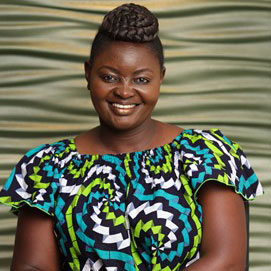A World of Open Data Bridges for Women
December 16, 2021
Connecting across the globe, the Africa Open Data Collaborative hosted a U.N. World Data Forum watch party. Blending in-person and virtual options, about 30 people across several countries and continents joined to listen in on the session “Empowering Women to Join the Data Revolution to Improve Lives” on October 5. Combining Zoom and Signal to augment the in-person group in Nairobi, Kenya, this watch party was an exciting extension of the meetings African Open Data Collaboratives hosts each month.
The session, moderated by Agnieszka Rawa, Managing Director, MCC-PEPFAR, stressed the urgent need for more women to get involved in data-related fields. Our group discussed how we had seen women and girls excluded from educational opportunities, schools, and particularly in STEM training and data science throughout African nations and the world at large.
One of the panellists Mahadia Tunga a Co-Founder of Tanzania Data Lab noted the need of empowering women with the digital skills. She also noted in Tanzania they were urging for more girls to stay in school till tertiary level which currently is a huge challenge. This was of particular interest as it related to a speaker series we hosted in July 2021 centered around the role of data in creating civic and public accountability.
 That particular speaker series focused on the social impact of data-driven organizations. That session featured case studies from Nigeria where government procurement data was used to address declining rates of female attendance in school by creating safer, cleaner, and academically appropriate facilities. It was exciting to draw parallels between this case study presented in our session four months prior with that shared by Mahadia at the World UN Data Forum.
Another parallel that was thrilling to see was the impact of data training. Mahadia shared the success story of a nurse who, after receiving training in basic excel spreadsheets, was able to create actionable outcomes at her work place, even receiving a promotion and acclaim as a direct result. Our watch party was excited to hear about this example as free monthly data skills training is a new type of virtual event that Open Data Collaboratives began hosting this year. Several of our watch party members have been participants and hosts at these virtual sessions and have worked across the Global South and Middle East teaching data literacy and skills in person pre-pandemic.
That particular speaker series focused on the social impact of data-driven organizations. That session featured case studies from Nigeria where government procurement data was used to address declining rates of female attendance in school by creating safer, cleaner, and academically appropriate facilities. It was exciting to draw parallels between this case study presented in our session four months prior with that shared by Mahadia at the World UN Data Forum.
Another parallel that was thrilling to see was the impact of data training. Mahadia shared the success story of a nurse who, after receiving training in basic excel spreadsheets, was able to create actionable outcomes at her work place, even receiving a promotion and acclaim as a direct result. Our watch party was excited to hear about this example as free monthly data skills training is a new type of virtual event that Open Data Collaboratives began hosting this year. Several of our watch party members have been participants and hosts at these virtual sessions and have worked across the Global South and Middle East teaching data literacy and skills in person pre-pandemic.
Other panelists in the session were Katerina Ntep, Deputy Vice President, Sector Operations Millennium Challenge Corporation, Prof. Margot Gerritsen, Stanford University at Stanford Women in Data Science (WiDS), and Mar Carpanelli, Senior Data Scientist / Americas Policy Lead LinkedIn.

 While the nature of a virtual conference may lead many viewers to engage with the content on an individual level, our watch party found particular joy and insight in experiencing the session together, as a group. The UN World Data Forum brings together data and statistical experts and users from governments, civil society, the private sector, donor and philanthropic bodies, international and regional agencies, the geospatial community, the media, academia and professional bodies. Data experts and users gather to spur data innovation, mobilize high-level political and financial support for data, and build a pathway to better data for sustainable development.
While the nature of a virtual conference may lead many viewers to engage with the content on an individual level, our watch party found particular joy and insight in experiencing the session together, as a group. The UN World Data Forum brings together data and statistical experts and users from governments, civil society, the private sector, donor and philanthropic bodies, international and regional agencies, the geospatial community, the media, academia and professional bodies. Data experts and users gather to spur data innovation, mobilize high-level political and financial support for data, and build a pathway to better data for sustainable development.
The watch party brought attention to the urgent need for more women to get involved in data-related fields. In 2020, COVID19 reminded us daily of the value of data skills in an increasingly digital world, with only some parts of the world turning to digital tools to continue working, learning and connecting. Ensuring that women are well represented in data science and STEM careers may help them regain ground towards greater economic parity, a priority for the Millennium Challenge Corporation (MCC) and for fulfillment of the Sustainable Development Goals for many nations throughout Africa.
We discussed the importance of including a diverse set of voices in the analysis of data, and that we all had a responsibility to reach out to and encourage women and girls to get training and stay involved.
If you’d like to join a future call, join the Africa Open Data Collaboratives here.

